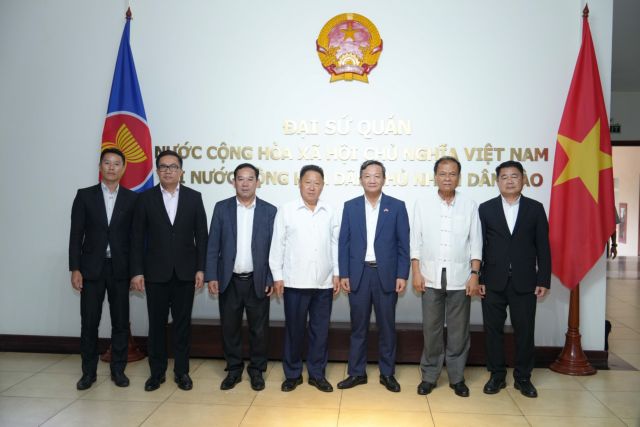 Society
Society


|
| Vietnamese Ambassador Nguyễn Minh Tâm (third from right) and participants at the gathering.—VNA/VNS Photo Bá Thành |
VIENTIANE — Vietnamese and Lao press agencies convened in Vientiane on Tuesday to chart new paths for media collaboration between the two sides as Việt Nam prepares to celebrate the 100th anniversary of the Revolutionary Press Day (June 21).
Vietnamese Ambassador Nguyễn Minh Tâm laid stress on the significance of the event, the first official gathering of its kind with full participation from both countries' media management and press agencies.
He praised the effective coordination between Vietnamese and Lao media in recent years, which has contributed to strengthening the great friendship, special solidarity, and comprehensive cooperation between the two nations
He proposed several strategic directions for future collaboration, including enhanced information-sharing and professional exchanges, more favourable conditions for journalists covering major events, and expanded media coverage of bilateral ties and development achievements in each nation.
He also underscored the importance of embracing modern technology to reach the audiences, particularly young demographic, and suggested the Lao side support the broadcasting of a new English-language channel of the Việt Nam Television via the VL2000 friendship infrastructure and the over-the-top (OTT) platforms in the country.
For his part, Laopaoxiong Navongxay, member of the Lao People’s Revolutionary Party (LPRP) Central Committee and deputy head of its Commission for Propaganda and Training, affirmed that the press has played an important role in bolstering the Việt Nam – Laos relations, highlighting his commitment to continued support for Vietnamese journalists working in Laos and encouraged greater collaboration between the press sectors of both countries.
Leaders from press agencies emphasised the essential role journalism plays in deepening mutual understanding and people-to-people bonds.
Amid the evolving digital media landscape, participants stressed the need to innovate both content and presentation formats.
They called dvocated for the adoption of advanced technologies to ensure timely, accurate, and broad-reaching coverage.
Media, they noted, must not only serve as a channel for information but also act as a vanguard in shaping public opinion, combating misinformation, upholding the Party’s ideological principles, and reinforcing unity between the two nations.
They affirmed closer coordination in external communications efforts, aiming at deepening the traditional friendship between the two Parties, States, and peoples.— VNS




